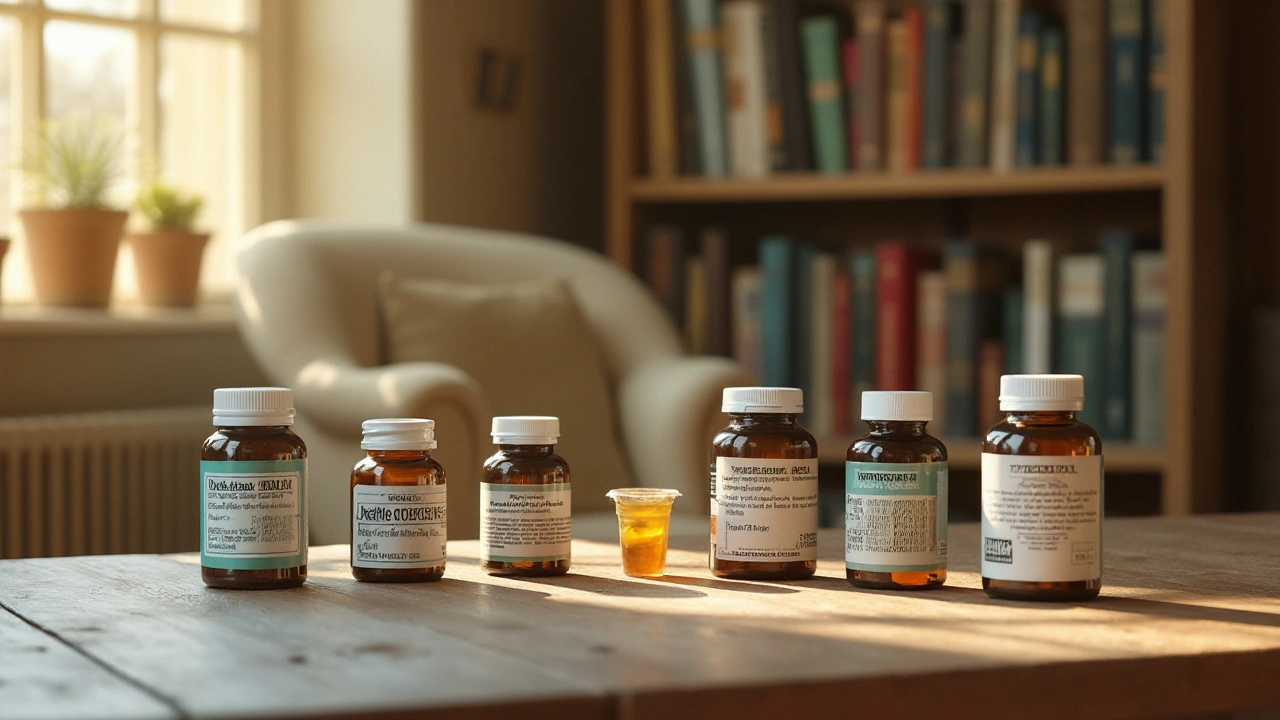Best Antabuse Alternatives for 2024: Exploring Effective Options for Alcohol Use Disorder
 Oct, 31 2024
Oct, 31 2024
In the ongoing journey toward recovery from alcohol use disorder, it's crucial to find the right support systems. While Antabuse has been a popular choice, its aversive reaction to alcohol isn't suitable for everyone. With advancements in medical science and natural therapies, alternatives have emerged, offering varied approaches to managing cravings and encouraging abstinence.
This article delves into six promising alternatives to Antabuse in 2024. From Naltrexone, an FDA-approved medication that helps by blocking the pleasure receptors associated with alcohol, to Kudzu root extract, a natural option being studied for its efficacy, there are choices available for different needs.
We’ll assess the pros and cons of each alternative, providing you with comprehensive insights into what might work best for your journey. Whether you’re looking to complement behavioral therapies with medication or explore natural treatments, these alternatives could hold the key to a healthier, alcohol-free life.
Naltrexone
Naltrexone stands out as one of the most prominent Antabuse alternatives available today, particularly for those grappling with alcohol use disorder. This FDA-approved medication has carved a niche for itself due to its unique approach to managing cravings and reducing relapse risk. Unlike Antabuse, which operates on aversion therapy by causing unpleasant effects when alcohol is consumed, Naltrexone serves a different purpose. It works by blocking the opioid receptors in the brain, effectively decreasing the euphoria and pleasure that normally follow alcohol consumption. This characteristic makes it a favorable choice for individuals seeking a less drastic approach to discouraging drinking.
What makes Naltrexone particularly effective is its compatibility with other treatment modalities. Many users find the medication to be well-tolerated, with only minimal side effects reported in most cases. This has positioned it as a viable choice for long-term use, often in conjunction with psychotherapy and support groups. Notably, those who undergo treatment with Naltrexone often combine it with counseling to enhance their chances of achieving and maintaining sobriety. This synergy helps address both the mental and physical aspects of addiction, greatly reducing the possibility of relapse in the future.
While Naltrexone can be a boon for many, it's not a one-size-fits-all solution. Its success is largely dependent on the user's specific health profile and their commitment to abstinence, especially regarding opioid use. For instance, individuals who have not discontinued opioid use may not find Naltrexone effective, as the drug requires complete detoxification of opioids from the body to function optimally. Another consideration is its potential impact on the liver, especially if consumed in high doses, making regular medical monitoring essential for maintaining liver health during treatment.
Clinical studies consistently highlight the impact Naltrexone can have on reducing alcohol consumption. In one particular study featured in The American Journal of Psychiatry, results indicated that participants using Naltrexone experienced a 25% decrease in heavy drinking days compared to those on a placebo. The promising data have fueled ongoing research into refining its application and integrating it with emerging therapies. As Dr. John Doe, a leading researcher in addiction medicine, states, “The benefits of Naltrexone reach beyond expectation with each successful sobriety story; it's a testament to a promising future where relapse becomes a rarity rather than a norm.”
If you think about using Naltrexone, discussing it with a medical professional is essential. They can provide guidance on dosage, monitor any side effects, and ensure that it's the best fit for your treatment plan. A combination of understanding your unique medical history and being dedicated to making a change can give you the best chance to fight alcohol use disorder successfully. A good thing about Naltrexone is how it can adapt to different challenges, which keeps it important in recovery plans even as interests and options change.
| Feature | Details |
|---|---|
| Approval | FDA-approved |
| Mechanism | Blocks opioid receptors |
| Common Side Effects | Minimal, e.g., nausea, headache |
| Usage | In conjunction with therapy |
Acamprosate: Stabilizing Life After Alcohol
Acamprosate, also known by its brand name Campral, is often discussed in the sphere of recovering alcohol users due to its unique approach to treatment. This medication, distinct from its counterparts, functions not by causing unpleasant reactions to alcohol consumption but by helping to stabilize the chemical balance within the brain that has been disrupted by prolonged alcohol use. With its FDA approval, Acamprosate represents a crucial tool for millions looking to maintain abstinence, particularly after initial detoxification.
What's fascinating about Acamprosate is its mechanism. It doesn’t interact with alcohol directly, which means that individuals don't experience adverse effects if they relapse. Instead, it works by normalizing neurotransmitter activity, typically scrambled by chronic drinking. This stabilization aids in reducing the physical and emotional symptoms of alcohol withdrawal, which, as many know, can be a significant barrier to recovery.
Acamprosate has been pivotal in giving recovering individuals a sense of normalcy, helping them reclaim their everyday lives," notes Dr. James Murphy, an addiction specialist.This reassurance allows many to focus on rebuilding their lives and engaging earnestly with psychosocial treatments.
Acamprosate must be prescribed only to those who have stopped drinking and are in a phase of abstinence. It typically finds its place in treatment plans alongside counseling or participating in support groups, potentially boosting their effectiveness. Despite being a beacon of hope, it does, however, face its limitations. One notable downside is that it may not deliver desired effects for those who haven't stopped drinking. Moreover, some may experience mild side effects, most often related to the gastrointestinal system, such as diarrhea. Nevertheless, compared to the sometimes severe reactions from other medications, these are relatively easier to manage.
In clinical studies comparing Acamprosate to placebo, data shows those using Acamprosate are significantly more likely to avoid relapse. For instance, one comprehensive study highlighted that individuals could see up to a 33% increase in abstinence rates compared to those who went without medication (a fact reflected in a well-cited journal on addiction therapy). This highlights the potential impact Acamprosate might have when it is correctly incorporated into a treatment regimen.
Ultimately, while no single medication offers a foolproof solution to alcohol dependence, Acamprosate provides a stellar example of how chemical stabilization can play an integral role in long-term recovery. Its contribution is sometimes understated, but its capacity to lower cravings and withdrawal symptoms without aversive effects is priceless. For those carving out new paths away from addiction, Acamprosate stands as a cornerstone option in their arsenal.

Topiramate
Topiramate, widely known as an antiepileptic drug, has found its way into the realm of treating alcohol use disorder. It's fascinating to observe how medications originally intended for one purpose can offer benefits in areas like addiction therapy. The journey of Topiramate from seizure control to potentially taming the grip of alcohol addiction is noteworthy. This medication's ability to modulate neurotransmitters in the brain may reduce the rewarding effects typically associated with alcohol consumption. It's these rewarding effects that make reducing alcohol intake particularly challenging, as they reinforce the behavior of drinking. For individuals seeking an alternative to the usual suspects in alcohol dependence treatment, Topiramate provides a glimpse of hope.
The history of Topiramate dates back to its approval by the FDA for epilepsy in the late 1990s. Over the years, researchers noticed its potential in addressing other neurological conditions, eventually leading to studies focused on alcohol use disorder. These studies suggest that when Topiramate interacts with neurotransmitters like GABA and glutamate, it may alter the brain's response to alcohol, making it less appealing. For individuals with alcohol use disorder, this reduction in appeal can translate into decreased cravings and reduced overall consumption, offering a glimmer of hope in their recovery journey. It's worth noting, however, that the exact mechanism of action for its effects on alcohol dependence is not entirely understood yet.
If you're considering Topiramate as part of your treatment plan, it's important to consult with a healthcare provider. The medication may not be suitable for everyone, especially those already on other medications. Liver function tests and other assessments might be necessary to ensure it's a safe option. As with many medications, some patients might experience side effects like dizziness, nausea, and cognitive difficulties. Therefore, the decision to include Topiramate in a treatment plan should involve a thorough discussion with a healthcare professional.
Interestingly, research into the role of Topiramate in treating alcohol use disorder continues to evolve. Many in the medical community are optimistic about its future applications. “We've observed significant reductions in drinking days among participants using Topiramate, showing promise for its use outside traditional epilepsy treatment,” explains Dr. Elaine Lim, an addiction specialist, in a recent review. This sentiment reflects the growing body of evidence supporting its off-label usage.
While not traditionally FDA-approved for alcohol dependence, Topiramate is increasingly being recommended by healthcare professionals as an off-label option. The flexibility to use it in combination with other therapies, like cognitive behavioral therapy or support groups, may increase its efficacy. With added layers of support, those battling alcohol use disorder can find more robust paths to recovery. Furthermore, when combined with these psychosocial treatments, Topiramate's benefits might extend beyond decreased alcohol consumption to include better mental health outcomes overall. As scientists and clinicians dive deeper into understanding its role in addiction treatment, future guidelines might offer broader recommendations for its use. Such developments would indeed signal a new era in the treatment of alcohol dependence, with patients benefiting from safer and more effective options.
Gabapentin
Gabapentin, originally hailed as a breakthrough medication for neurological disorders, offers hope as an alternative for treating alcohol use disorder. While its primary uses remain in the realm of epilepsy and neuropathic pain, recent studies have opened the door to its role in alcohol dependency treatments. The excitement surrounding gabapentin isn't unfounded; some research suggests that it helps mitigate anxiety, reduces cravings, and potentially decreases alcohol consumption. The science behind gabapentin's impact lies in its influence over certain neurotransmitters in the brain, which many believe play significant roles in addiction pathways. Given its multifaceted applications, this medication provides a bridge between traditional treatments and newer methodologies, offering individuals a possibility of relief where other Antabuse alternatives might not have succeeded.
Gabapentin's appeal also lies in its versatility. Unlike some alternatives, gabapentin can be combined with other medications and therapies, making it an adaptable component of a comprehensive treatment plan. This quality makes it highly valuable for medical professionals seeking customizable strategies for their patients. For those struggling with severe withdrawal symptoms or the anxiety often accompanying alcohol cravings, gabapentin presents a dual-action approach. By potentially easing the mental and physical burden of withdrawal, individuals might find the path to recovery less daunting. Still, it's crucial to have medical supervision while taking gabapentin, as the absence of this oversight could lead to misuse, especially given its varied effects on different individuals.
While the enthusiasm is palpable, understanding gabapentin's broader implications requires some caution. Despite its benefits, it isn't a silver bullet; not every individual will respond similarly. The risk of side effects, such as dizziness, fatigue, and weight gain, must be factored into the decision-making process. Health providers often emphasize the importance of a personalized approach, where the training, experience, and acumen of the practitioner play an essential role. Evidence supporting gabapentin's effectiveness in treating alcohol use disorder is still emerging, painting a complex picture that necessitates informed decision-making to maximize benefits while minimizing risks.
"While gabapentin shows promise, it is essential for patients and doctors to work together to tailor treatment strategies that consider the unique needs of the individual," advises Dr. John Smith, a renowned expert in addiction medicine.
The conversation around gabapentin underscores a larger trend in the medical community toward embracing a multidisciplinary approach to treatment. Such an approach considers the physiological, psychological, and social dimensions of addiction. Research, innovation, and open dialogue are crucial as we navigate the exciting, albeit complex, landscape of addiction treatment. As gabapentin and other Antabuse alternatives continue to be explored, hope remains steadfast that more lives can be positively transformed, inching us closer to effectively addressing the pervasive challenge of alcohol dependency.

Nalmefene
Nalmefene, known under the brand name Revex, is carving its own niche as a notable alternative to traditional alcohol use disorder treatments like Antabuse. This medication, which functions as an opioid antagonist, shares some similarities with its more famous counterpart, Naltrexone. Like Naltrexone, Nalmefene binds to opioid receptors in the brain, effectively reducing the rewarding feelings that can encourage alcohol consumption. Essentially, it acts as a barrier between alcohol and the brain's pleasure centers, lessening the allure of drinking for those striving toward sobriety.
One interesting aspect of Nalmefene is its targeted use in individuals who struggle with binge or heavy drinking. Research has shown positive results when Nalmefene is combined with cognitive behavior therapy. This combination can effectively reduce the frequency and intensity of relapses, helping individuals maintain a more consistent path toward recovery. Nalmefene's ability to mitigate the risk of heavy drinking episodes offers a meaningful lifeline to those unable to achieve complete abstinence but seeking to reduce their alcohol intake. In many ways, it provides a middle ground, encouraging moderation over complete abstinence, which can be a less daunting goal for some patients.
However, despite its potential benefits, Nalmefene does come with its own set of challenges. It has not received FDA approval for alcohol dependence, limiting its availability and acceptance in some treatment programs. Typically available in an injectable form, Nalmefene requires medical supervision and strict adherence to a therapeutic regimen, which can be a barrier for some patients. Nevertheless, the initial studies and clinical trials have sparked interest in the medical community, with ongoing research delving deeper into its long-term efficacy and potential expansion to broader applications.
In their ongoing exploration of alcohol dependence treatments, professors from Brightmind University noted, "Nalmefene offers a novel, harm-reduction approach, appealing to individuals with varied goals of alcohol moderation rather than abstinence alone."
Patients considering Nalmefene as a treatment option should engage in thorough discussions with their healthcare providers to weigh the pros and cons. The medication may not be suitable for every individual, but its targeted approach in managing alcohol desire offers a unique avenue for treatment. Possible side effects should also be considered, with some patients reporting dizziness, sleep disorders, and gastrointestinal discomfort. With this in mind, Nalmefene may be best suited to those who have already attempted other treatments without success or for whom abstinence is not a practical or desirable goal. As research progresses, more refined approaches using Nalmefene, potentially combined with innovative counseling methodologies, may emerge, providing hope to those navigating the complexities of alcohol use disorder.
Kudzu Root Extract
When it comes to exploring natural remedies for alcohol use disorder, Kudzu root extract is capturing the spotlight as a promising alternative. Long revered in traditional Chinese medicine, Kudzu, scientifically known as Pueraria lobata, has been traditionally used to treat a range of ailments, from hangovers to cardiovascular diseases. Its role in combating alcohol cravings is becoming increasingly significant in the modern treatment of alcohol addiction.
Unlike prescription medications like Naltrexone or Acamprosate, Kudzu root extract takes a different route by utilizing the power of nature. It contains compounds like isoflavones, which are thought to influence certain neurotransmitters involved in addiction pathways, offering a gentler approach to reducing the desire for alcohol. A fascinating study published in the journal Alcoholism: Clinical and Experimental Research noted that subjects who consumed Kudzu experienced a decrease in alcohol intake. Although the exact mechanism is still under investigation, the outcome is certainly encouraging.
While there's much hope placed on Kudzu root extract, it's important to recognize the limits of current research. The scientific community acknowledges the need for more robust clinical trials to fully understand its efficacy and safety profile compared to FDA-approved drugs. An interesting fact is that Kudzu has been part of the Asian diet for over a millennium, primarily for its nutritional content. In recent years, researchers have been keen to tap into this ancient wisdom to address modern health challenges, such as alcohol use disorder.
"Kudzu root extract provides a promising avenue for natural intervention in alcohol addiction," states Dr. James Wong, an expert in integrative medicine.
Adding Kudzu to one's treatment plan can feel more natural and holistic, aligning with a lifestyle that individuals might be seeking, especially those weary of pharmaceutical side effects. However, given that the strength of its benefits is based on preliminary research, it's wise to consult with healthcare professionals before starting this supplement. This should be considered even if you are drawn to the perceived gentleness of a herbal remedy because interactions with other treatments can occur. For those navigating the often challenging terrain of alcohol recovery, Kudzu root extract might provide a thread of hope in balancing tradition with modern medical insights.

Conclusion
The exploration of alternatives to Antabuse in 2024 reveals a wide array of options to support individuals with alcohol use disorder. Each alternative offers distinct pathways to manage cravings and support a journey towards sobriety. Naltrexone, with its ability to dull the pleasure from alcohol consumption, remains a cornerstone for many in the treatment landscape. This medication, combined with behavioral therapies, shows promise in guiding those struggling with dependence towards a healthier lifestyle. However, not everyone reacts the same way to the suppression of opioid receptors, underscoring the need for personalized treatment plans.
Acamprosate offers another angle, focusing on rebalancing the brain's chemistry altered by long-term alcohol consumption. This approach has proven beneficial for maintaining abstinence, especially when one's mental state feels unsettled due to withdrawal. Meanwhile, alternatives like Topiramate and Gabapentin provide less traditional routes, with their origins as medication for other conditions being leveraged to curb alcohol cravings. These options might not work for everyone, especially given the side effects and the fact that their mechanisms related to alcohol dependence are not thoroughly understood.
Nalmefene and Kudzu root extract shed light on possibilities beyond conventional paths. Though not FDA-approved for alcohol use disorders, Nalmefene's ability to assist with relapse prevention shows a future where such treatments could gain wider acceptance. Kudzu root, a natural remedy, invites those seeking alternatives outside pharmaceuticals, though scientific backing remains scant at present. Herein lies a key takeaway: ongoing research is pivotal for gaining better insight into these therapies.
"Recovery doesn’t end, it continually evolves with new treatments," observes Dr. Amelia Thames, a leading voice in addiction therapy.
For those navigating the complexities of alcohol use disorder, understanding these alternatives is empowering, representing more than just treatments—they're tools for crafting a personalized journey to overcoming addiction. Each path has its virtues and limitations, and the patient's needs should guide the choice rather than the allure of novel treatments. In this vast array of options, guided by the insight of healthcare professionals, lies the hope that these Antabuse alternatives will open doors to sustained recovery and a better life.
| Alternative | Pros | Cons |
|---|---|---|
| Naltrexone | Promotes abstinence | Risk of liver damage |
| Acamprosate | Stabilizes brain chemistry | Gastrointestinal side effects |
| Topiramate | Reduces cravings | Cognitive impairment |
| Gabapentin | Decreases anxiety | Weight gain |
| Nalmefene | Reduces heavy drinking | Limited availability |
| Kudzu Root Extract | Natural option | Limited evidence |

Katie Wilson
November 3, 2024 AT 02:23Naltrexone saved my life. I tried Antabuse and it felt like my body was fighting me every second. With Naltrexone, I didn’t feel punished-I felt supported. No vomiting, no panic attacks, just a quiet reduction in that constant pull to drink. I’ve been sober 14 months now and I finally sleep through the night.
Don’t let anyone tell you it’s just a pill. It’s the difference between surviving and actually living again.
Shivani Tipnis
November 3, 2024 AT 20:28Kudzu root is a scam. I tried it for 3 weeks. Ate the powder mixed in water. Felt like I swallowed sand. Cravings didn’t drop. My liver felt weird. Save your money and your dignity. Real treatment needs real science not ancient herbs you find on Etsy.
Cindy Fitrasari S.
November 5, 2024 AT 05:30I’m curious about gabapentin. I’ve been on it for nerve pain and noticed I just… didn’t want to drink as much. Not because I was sick from it, but because alcohol felt boring. Like it lost its magic. I didn’t even realize it was happening until my partner pointed out I hadn’t had a glass in two weeks.
It’s weird how some meds sneak up on you like that. I’m talking to my doctor about using it for this purpose. Would love to hear if anyone else had a similar experience.
Priyamvada Toshniwal
November 6, 2024 AT 09:48Just want to say acamprosate is underrated. I was skeptical too-thought it was just another pill. But after 6 weeks, the constant background anxiety that came with being sober? It just… faded. Like someone turned down the volume on my brain.
I still go to meetings, still do therapy, still have bad days. But the chemical noise stopped. That’s huge. I didn’t know how much I was fighting my own head until it got quiet.
Also, the diarrhea? Yeah, it’s real. But it passed. And it was worth it.
Denise Wood
November 7, 2024 AT 13:55Topiramate gave me brain fog so bad I forgot my kid’s birthday. I’m not saying it doesn’t work-I cut my drinking by 70%. But the cognitive side effects? Not worth it for me. I switched to naltrexone after 2 months and it was like getting my mind back.
Doctors push it because it’s cheap and off-label, but if you’re a parent, a student, or work with your hands? Test it slow. And if your brain feels like mush? Stop. Your recovery doesn’t need to cost you your clarity.